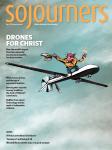ETHICS ASKS the questions: What is right to do? How do we know? David P. Gushee puts the concept of the sacredness of human life at the center of his moral reasoning. A professor of Christian ethics at Mercer University in Atlanta, Gushee has given us a work that is an important milestone on the road of constructive Christian ethics.
In this book Gushee has set himself a large and ambitious goal. He writes, “I am proposing that, rightly understood, a moral norm called the sacredness of life should be central to the moral vision and practice of followers of Christ.”
He seeks to ground this moral norm in scriptural authority and in the Christian tradition at its best. His survey of scripture and of Christian history is truly impressive, considering most of the major elements of the Christian theological and ethical traditions, including the current thinking of liberation theology. He demonstrates knowledge of the feminist critique of scripture, and he at least mentions eco-feminism. The bibliography alone is worth the price of the book.
Moreover, Gushee also considers such important Enlightenment thinkers as John Locke and Immanuel Kant. He devotes a chapter each to German philosopher Friedrich Nietzsche and to the Nazi desecration of human life. There is much food for thought here.
For me, however, the book is primarily descriptive. And it does not provide an explanatory framework to help us understand why scripture and the Christian tradition have led the way in both the recognition of the sacredness of human life and in the violation of this holiness. It would have been helpful for Gushee to give us a brief discussion of Ernst Troeltsch, who in his two-volume The Social Teachings of the Christian Churches enables us to see that the line of demarcation between the church and the world is porous to the point that there is always interpenetration between the two. Church teachings leaven and flavor the moral thinking of the world outside its doors while the world’s often destructive ideologies come to church every Sunday and sit down on the front pew and sometimes preach from the pulpit.
In a book this size, there are bound to be gaps, and Gushee acknowledges this. He recognizes that his central thesis will present puzzles. He describes 17 such puzzles and gives his final answer to nine of them. Still, he does not begin to resolve the fundamental internal contradiction at the heart of both scripture and Christian tradition—the conflict between theology and morality.
He cites the Exodus story as biblical evidence that God cares about the sacredness of human life when he brings the children of Israel out of bondage. This story, however, presents us with a God that cannot be both holy and moral. If God is holy, then whatever God does for the sake of God’s own glory is also holy, including the murder of innocents. Morality is irrelevant. If we want to see God as moral, then the God of the Exodus story cannot be holy. Eight times in this story God hardens the heart of Pharaoh and then punishes him and the entire nation, including animals, for a disobedience that God caused (Exodus 7:3, 9:12, 10:1, 10:20, 10:27, 11:10, 14:4, 14:17). God in this telling shows no regard for the sacredness of human life.
Gushee also says that anti-Semitism is Christianity’s original sin. He does not consider the original moral contradiction of the doctrine of salvation through faith in the grace of God alone. This doctrine is at once Christianity’s greatest theological achievement and its most profound moral challenge. God only knows how many Christians have excused their immoral acts against humankind and all of creation with the blessed assurance of their eternal salvation, piously confessing to the same sins every Sunday.
Gushee wants the concept of the sacredness of human life to bridge the gap between conservative Christians who primarily use the concept to argue against abortion and progressive Christians who primarily use it to argue in favor of social and environmental justice. He wants the concept to speak to the logic of human rights and human dignity in a nonsectarian public discourse. This book is a valiant effort toward that end.

Got something to say about what you're reading? We value your feedback!